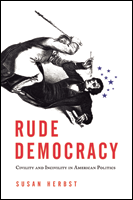You have /5 articles left.
Sign up for a free account or log in.
A campus lecture at the University of Connecticut Tuesday on the topic of "It's OK to Be White" turned into an event that was by all accounts not OK at all.
A speaker, the conservative pundit Lucian Wintrich, was there to talk on a topic many students believed was designed to insult black people and those who believe that minority individuals face real bias in American society. Wintrich -- and the student Republican group that brought him to UConn -- were not pleased, either. He was shouted down, and when one audience member grabbed his notes and he followed her into the audience, he was arrested for his actions during the altercation. He is accusing those who disagree with his views of denying him a platform to talk.
"We didn't do well" was the assessment of Susan Herbst, the president of UConn, in an interview Wednesday.
Many college presidents have been confronting questions of how to handle campus controversies involving incendiary speakers and the resulting protests. For Herbst, these issues aren't just part of her job as president. A political science and communications scholar, she has studied public discourse, focusing in recent years on incivility. Her last book, published shortly before she was named UConn's president in 2010, was Rude Democracy: Civility and Incivility in American Politics (Temple University Press), which focused on the 2008 presidential election and the beginning of the Obama administration,
 In the book and in the interview Wednesday, she placed much of the blame for incivility in public discourse on Congress. While some lawmakers have always embraced extreme positions, Herbst said that a long tradition in which lawmakers tried for compromise eroded in the 1990s. Gerrymandering has allowed many House members to have safe seats where they don't need to think about broadening their bases. Republican leaders have also encouraged their House members to keep homes in their districts, so "there is less social interchange between Republicans and Democrats."
In the book and in the interview Wednesday, she placed much of the blame for incivility in public discourse on Congress. While some lawmakers have always embraced extreme positions, Herbst said that a long tradition in which lawmakers tried for compromise eroded in the 1990s. Gerrymandering has allowed many House members to have safe seats where they don't need to think about broadening their bases. Republican leaders have also encouraged their House members to keep homes in their districts, so "there is less social interchange between Republicans and Democrats."
Other factors -- such as "the outrage media" and social media -- are also at play in the deteriorating state of civil debate, she said. But Congress is key, as that is the institution Americans see and "take a cue from," she said.
"Imagine a world where Congress -- even with some extreme voices -- was set on compromise and discussion," she said. "That would be a different America."
Her book includes a chapter based on research on college students. She found at that time that many students already had difficulty with discussions with those of differing views. But if the consequence at the time was avoiding people with conflicting views, these days -- as at UConn this week -- confrontation is more accepted.
"There is a stepping out," she said. "It is imitating the rhetoric and discourse that we see" in national politics.
So those who brought Wintrich to campus selected a topic that they knew would goad minority students. And those students and others didn't boycott the event, but came to it determined to shout the speaker down.
Colleges and universities are places for debate, Herbst said, but that debate should be at a higher level than what UConn experienced this week.
Academic leaders need to do a better job of explaining that allowing a student group to bring in a speaker does not constitute an endorsement. "Our campuses are open, by law," she said, speaking of public institutions.
For UConn, Tuesday night's event was something of a test, she said, and the campus didn't pass. She said the university has not had the kinds of speaker controversies that have attracted so much attention elsewhere. "I thought we were ready to be tested," she said. "It's pretty clear we didn't do well."
"I'm guessing many presidents may feel like this the day after an event."
‘We Have to Work at It’
Going forward, Herbst said that "being passionate and civil is going to take practice. That's what I've been thinking about. We have to work at it."
So that means, she said, "we have to think back to the '60s, and it's going to be about fighting hate with love."
"We need dignity when faced with ugliness and hate," Herbst added. "We have to play the long game. We have our values, and they are not going to be easily implemented in this culture."
While campuses are known for speakers, panels and question-and-answer sessions, Herbst said she wants to promote more small discussions -- 20 or so people of different views -- in a room. "I've always believed that the big venues when there is a speaker and a panel -- in the campus cultures, that's not the kind of work we need to do."
In smaller settings, with faculty members playing a lead role, students can learn to talk to one another, to disagree and to let others talk.
Coming out of such discussions, she said, students need to understand why shouting down speakers is not appropriate, especially in an academic setting.
"I don't think anybody -- faculty, administrator or a lot of students -- wants to hear hate," she said. "It is really hard to hear things that are hateful or that you disagree with. That kind of strength of character to sit there and listen and then ask questions, we're going to have to work on that on a more micro level," she said.
"It's not easy for any of us, but the shouting down is wrong. You have to hear what the other person is saying."








